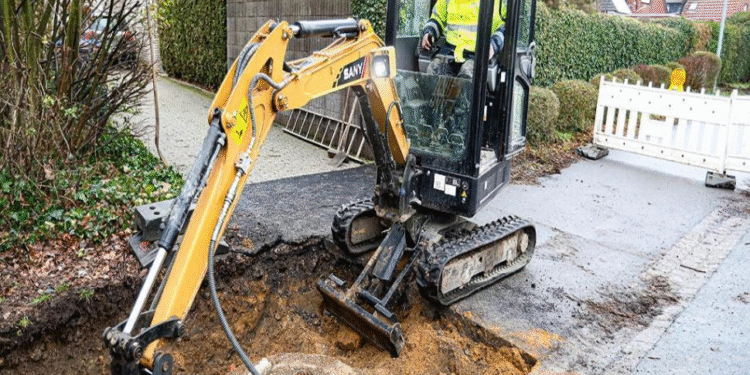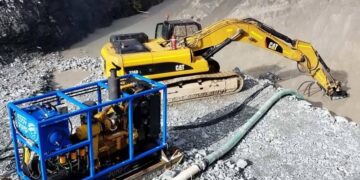Understanding whether a mini or medium excavator best fits your construction needs is critical to project success. Each type has unique strengths and limitations that affect cost, efficiency, and overall performance. This guide explores the key differences, advantages, and ideal use cases of both categories, helping you make an informed decision based on project requirements, budget, and long-term operational goals.
Key Differences Between Mini and Medium Excavators
Size and Weight Comparison
A mini excavator generally weighs between 1 to 8 tons and is designed with a compact structure, making it highly effective in small or congested spaces. Medium excavators, ranging from 9 to 20 tons, are better suited for broader work areas. Deciding between these categories depends on spatial constraints, job site accessibility, and how the machine’s weight impacts soil conditions.
Digging Depth and Reach
Mini excavators typically provide a digging depth between 5 and 14 feet, ideal for shallow projects or localized excavation tasks. Medium excavators extend deeper, reaching approximately 15 to 20 feet, which makes them suitable for larger undertakings like basement construction or major trenching. Evaluating project scope carefully ensures the excavator selected meets reach requirements without creating inefficiencies or excessive operating costs.
Power and Performance Levels
Mini excavators generally offer engines ranging from 10 to 40 horsepower, providing enough capability for light to moderate work. Medium excavators are more powerful, typically equipped with 40 to 70 horsepower or beyond, enabling them to handle challenging jobs efficiently. Determining the correct option depends on workload intensity, productivity goals, and the expected performance level required for safe, effective project execution.
Advantages of Mini Excavators
Compact Design and Easy Maneuverability
Mini excavators excel in environments where space is tight and maneuverability is crucial, such as urban construction zones or work inside buildings. Their lightweight, compact design allows operators to access areas where larger machinery cannot function effectively. This makes them invaluable for tasks requiring agility and precision, ensuring smoother operations in confined or delicate job site conditions.
Cost-Effective Operation and Fuel Efficiency
Mini excavators are highly economical to operate, with lower fuel consumption and reduced daily running costs compared to larger models. Their lightweight design minimizes wear while increasing fuel efficiency, resulting in long-term savings. These machines also reduce environmental impact by consuming less energy, making them both cost-effective and eco-friendly for contractors handling smaller, budget-sensitive construction projects.
Ideal Projects for Mini Excavators
Mini excavators are perfectly suited for residential landscaping, utility trenching, and small-scale demolition work. Their ability to fit into compact spaces while maintaining precise control makes them essential for suburban and indoor construction. These versatile machines deliver reliable results on projects where agility, efficiency, and minimal site disruption are critical, making them the preferred option for light to medium-duty tasks.

Advantages of Medium Excavators
Higher Power and Productivity
Medium excavators offer greater horsepower and advanced hydraulics, allowing them to complete heavy-duty tasks faster and with higher efficiency. Their increased strength supports large-scale construction, demolition, and material handling projects where productivity is paramount. For contractors managing demanding workloads, the added power of medium excavators translates directly into reduced project timelines and improved overall cost-effectiveness.
Versatility for Different Attachments
Medium excavators stand out due to their ability to support a wide variety of attachments, such as hammers, drills, and grapples. This adaptability allows them to transition seamlessly between tasks, from excavation to material handling. Their versatility gives project managers flexibility, enabling one machine to handle multiple requirements efficiently, reducing equipment needs and increasing operational value across diverse construction environments.
Ideal Projects for Medium Excavators
Medium excavators are best suited for large-scale operations, including road construction, foundation excavation, and significant demolition work. Their robust performance and extended reach allow them to handle demanding projects efficiently while maintaining safety and durability. These machines thrive on bigger sites where power and productivity are critical, making them indispensable for contractors managing complex or high-volume construction tasks.
Choosing Between Mini and Medium Excavators
Project Size and Job Site Conditions
When choosing between excavator sizes, project scale and job site conditions must be carefully considered. Mini excavators are more effective in compact or restricted areas, offering superior maneuverability. Medium excavators, however, are better for expansive sites requiring deeper digging and greater lifting capacity. Evaluating the geographical layout and working environment ensures the chosen machine performs optimally under specific site conditions.
Budget and Maintenance Planning
Budget constraints and maintenance planning significantly influence equipment choice. Mini excavators generally involve lower purchase prices, fuel costs, and routine service expenses, making them appealing for smaller projects or limited budgets. Medium excavators, although requiring higher investment, provide superior value on frequent, large-scale tasks. Assessing both upfront and long-term costs helps determine the most financially viable solution for your construction goals.
Long-Term Efficiency and ROI
Selecting the appropriate excavator size plays a crucial role in long-term efficiency and return on investment. Mini excavators deliver agility and cost savings for smaller-scale projects, while medium excavators ensure maximum productivity for heavier workloads. By aligning machine capabilities with project needs, contractors can achieve consistent performance, reduce downtime, and secure better ROI, ensuring sustainable growth across multiple construction initiatives.
Conclusion
Choosing between a mini and medium excavator depends on balancing your project’s scope, budget, and operational requirements. Mini excavators excel in agility, affordability, and small-site performance, while medium excavators provide superior strength and versatility for larger tasks. Carefully evaluating job site conditions, financial planning, and long-term efficiency ensures the right selection, helping your construction projects run more productively and cost-effectively.













